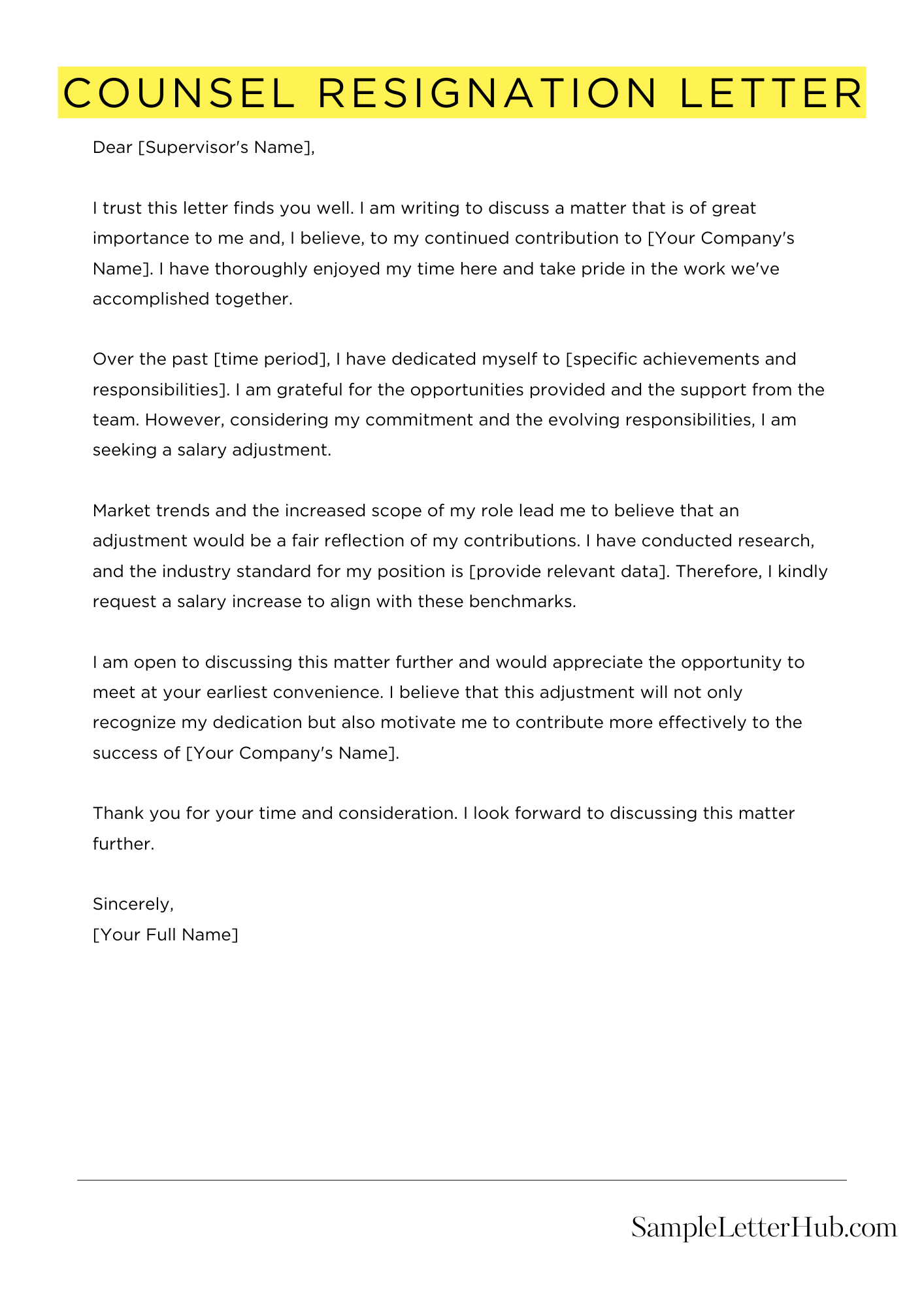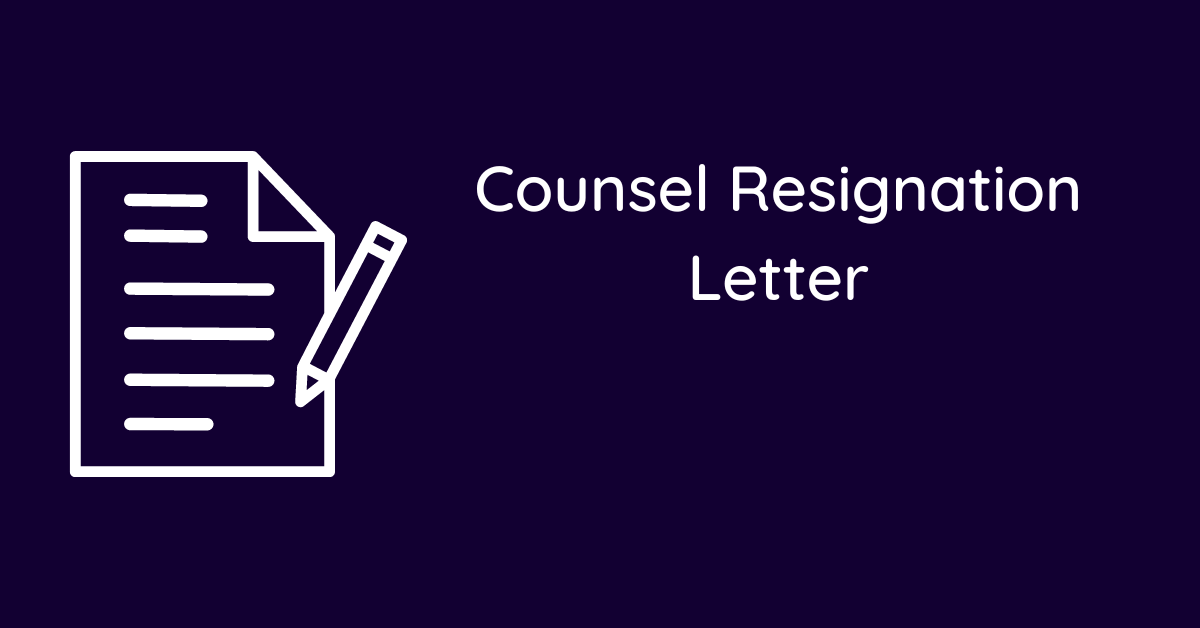When it comes to leaving a job, one way to do it is to write a clear and professional resignation letter explaining your decision to leave. In this blog article, we will share an example of a counsel resignation letter with you.
Be polite and humble in the letter tone. Remember to thank your employer for the opportunity to work with them and wish them well in the future.
Below, we have shared a template/example counsel resignation letter that you can use. Feel free to tailor it to your specific situation.
Counsel Resignation Letter
Dear [Recipient Name],
Please accept this letter as formal notification that I will be resigning from my position as Counsel at [Organization Name], effective [Last Date of Employment].
This decision has not been made lightly and I want to express my sincere gratitude for the opportunities and experiences I have gained during my time here. I have valued the support and guidance I have received from my colleagues and supervisors.
I wish you and [Organization Name] all the best in the future.
Sincerely,
[Your Signature]
Short Counsel Resignation Letter Sample
Please accept this letter as formal notification that I am resigning from my position as Counsel at [Company Name]. My last day of employment will be [Your Last Day]. Thank you for the opportunity to grow and learn during my time here. I wish you and the company continued success. I am happy to assist in the transition process to ensure a smooth handover of my responsibilities.
I wish you all the best with your counsel resignation letter.
When it’s time to say farewell, expressing your gratitude and best wishes can make the transition smoother:

How to Write a Counsel Resignation Letter
1. Start with a Formal Salutation
Begin your letter with a formal salutation, such as “Dear [Manager’s Name].” Avoid using informal greetings like “Hi” or “Hello.”
2. State Your Resignation Clearly and Concisely
In the first paragraph, state your intention to resign from your position as counsel. Be clear and direct, using language like “I am writing to inform you of my decision to resign from my position as counsel at [Company Name], effective [date].”
3. Express Gratitude and Appreciation
Take a moment to express your gratitude for the opportunity to work at the company. Mention specific experiences or projects that you enjoyed or learned from. For example, you could say, “I am grateful for the opportunity to have worked on the [project name] project, which was a valuable learning experience for me.”
4. Offer to Help with the Transition
If possible, offer to help with the transition during your notice period. This could include training your replacement, assisting with ongoing projects, or providing documentation. For example, you could say, “I am happy to assist with the transition in any way possible, including training my replacement and providing documentation for ongoing projects.”
5. End with a Professional Closing
End your letter with a professional closing, such as “Sincerely” or “Best regards.” You can also include your signature and typed name below the closing.
Counsel Resignation Letter: 6 Frequently Asked Questions Answered
Resigning from a counsel position can be a daunting task, but it’s important to approach it professionally and respectfully. Here are six frequently asked questions and answers to help you navigate the process smoothly:
1. What should I include in my resignation letter?
Your resignation letter should include the following information:
* Your name and contact information
* The date
* The name of the person you are resigning to
* A statement of your resignation
* Your last date of employment
* A brief expression of gratitude or well wishes
2. How should I format my resignation letter?
Your resignation letter should be formatted in a professional and concise manner. Use a standard business letter format, with your contact information at the top, the date, the recipient’s name and contact information, a salutation, the body of the letter, a closing, and your signature.
3. What should I say in my resignation letter?
Your resignation letter should be brief and to the point. State your intention to resign, provide your last date of employment, and express your gratitude for the opportunity to work at the firm. You can also include a brief statement about your future plans, if you wish.
4. When should I submit my resignation letter?
It is generally advisable to submit your resignation letter two weeks before your last date of employment. This will give your employer time to find a replacement and ensure a smooth transition.
5. What if I have a non-compete agreement?
If you have a non-compete agreement, it is important to review it carefully before submitting your resignation letter. Make sure you understand the terms of the agreement and how it will affect your future employment options.
6. What if I am resigning on bad terms?
Even if you are resigning on bad terms, it is important to remain professional and respectful in your resignation letter. Avoid making any negative comments about the firm or your colleagues. Instead, focus on the positive aspects of your experience and express your gratitude for the opportunity to work there.
Before making the decision to resign from your job, it’s essential to consider the legal aspects:
Understanding your emotions after quitting your job is important. Explore why you might be feeling sad:
Related
- Resignation letter sample
- Forced resignation letter
- Resignation letter due to going abroad
- Resignation letter due to marriage
- Resignation letter due to other opportunity
- Resignation letter due to mistake

